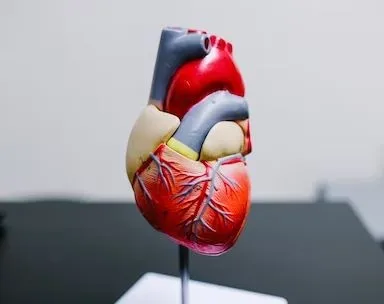Are Unhealthy Lifestyles Causing Your Heart to Age Faster?

Synopsis
Key Takeaways
- Unhealthy lifestyles accelerate heart ageing.
- New CMR MRI technology reveals the heart's 'true age.'
- Conditions like diabetes can age the heart faster.
- Early intervention can prevent heart disease.
- Awareness of heart health is crucial.
New Delhi, May 3 (NationPress) Unhealthy lifestyles are significantly speeding up the ageing of the heart, leading to an increase in various cardiovascular diseases globally, according to a study conducted by researchers of Indian descent in the UK.
Utilizing a novel Cardiac Magnetic Resonance (CMR) imaging method, also known as a cardiovascular MRI scan, the team from the University of East Anglia (UEA) revealed the “true age” of a heart.
The MRI scans demonstrated how unhealthy lifestyles can significantly advance the heart’s functional age.
While in healthy individuals, the heart's age aligned closely with their chronological age, patients suffering from diabetes, hypertension, obesity, and atrial fibrillation exhibited a notably older functional heart age.
“For instance, a 50-year-old with high blood pressure could have a heart that operates as if it were 55,” explained lead researcher Dr. Pankaj Garg, from UEA’s Norwich Medical School and a consultant cardiologist at Norfolk and Norwich University Hospital.
“Individuals with conditions like diabetes or obesity often possess hearts that are ageing much more rapidly than they should—sometimes by decades. This could enable doctors to intervene early to prevent heart disease,” he added.
The findings may revolutionize heart disease diagnostics—providing a critical opportunity to millions by identifying issues before they escalate into serious conditions, according to the researchers who labeled their innovative technique as a “game changer” for maintaining heart health.
“It could serve as a crucial wake-up call for individuals to improve their wellness—whether through healthier eating, increased physical activity, or adhering to medical advice. It’s about empowering individuals against heart disease,” remarked Garg.
The research team collaborated with hospitals across the UK, Spain, and Singapore, analyzing MRI scans from 557 participants, including 191 healthy individuals and 366 with conditions like high blood pressure, diabetes, or obesity.
Employing advanced imaging techniques, they assessed factors such as the size and strength of the heart's chambers. They then developed a formula to ascertain the heart's ‘functional age’ and validated it against healthy hearts for accuracy.
Heart disease remains one of the primary causes of mortality worldwide. The new MRI methodology equips doctors with a powerful instrument to examine the heart more comprehensively than ever before, enabling early detection of potential issues before symptoms manifest, stated the research team.
This research has been accepted for publication in the European Heart Journal Open.








